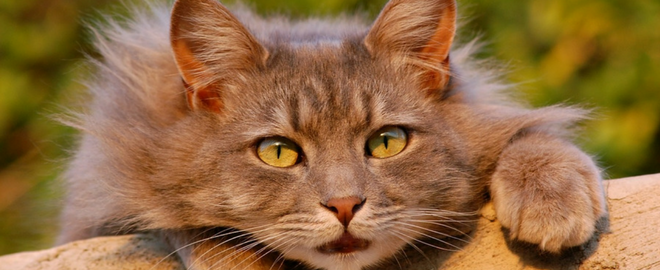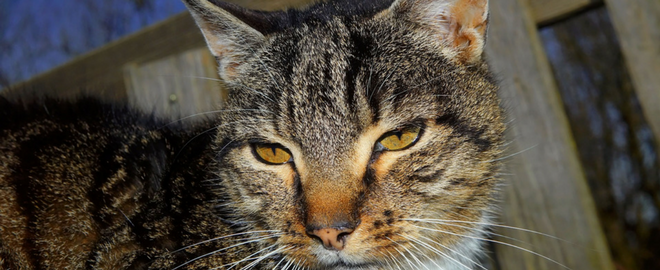Does Your Senior Cat Have These Common Health Problems?
Cats are good at hiding their pain. As natural predators, they know the weak and ill become prey so their instincts are to cover up any signs of weakness. Because of this tendency, it can be tough to know when your cat isn’t feeling well.
Yet, with cats living to 15, 20 years old and beyond, chronic health conditions are common. Some of them may not surprise you, kidney problems and even cancer are among the chronic health concerns facing the feline population. Your cat may also be at risk for hyperthyroidism and even arthritis.
While aging is a normal process, sickness and pain are not. As a loving pet owner, you want to help your cat age gracefully and spot any potential problems early. That way, your kitty can remain comfortable and you may be able to prevent a serious disease.

The key is a combination of regular veterinary visits combined with being tuned into your pet’s demeanor and normal behavioral patterns. When you’re tuned into your pet’s behavior you can take note when you start noticing changes. In fact, it’s a good idea to literally write down the changes - including time and context. That way, when you see your veterinarian you can share specifics.
In general, regular veterinary visits are recommended annually for cats under 8 years and twice a year for cats after 8 years.
If you have a senior cat, it’s good to be aware of a few of the common health problems.
Senior Cats - What Are Their Common Health Concerns?
Arthritis - also known as degenerative joint disease, this is a painful condition where the joints wear away cartilage until the bone scrapes against the bone. Ouch!
Arthritis can be genetic or caused by an old injury that didn’t heal properly. If your cat carries excess weight, this can cause even more pain due to the additional support needed.
Signs that your cat is suffering from arthritis includes reluctance to go up and down the stairs. If you suspect your kitty has painful joints, you can make sure she has easy access to the litter box (as in not having to step over a wall to enter.)
While there’s no cure for arthritis, your vet can help you find ways to minimize the pain.
Kidney Failure - This is a very common health problem with senior cats. Though the exact cause is unclear, many vets link it to high blood pressure and other ailments such as hyperthyroidism, both of which we’ll explore in a moment.
But first, let’s look at the kidneys and their function in your cat’s body. As you may know, these important organs are responsible for healthy elimination functions as one of their purposes is to remove waste from the body. They also help regulate blood pressure and make hormones.
There are two types of kidney failure in cats -- acute and chronic. Acute kidney failure can be brought on by ingesting poisons like antifreeze or toxic plants. Yet, it’s usually the chronic type of kidney failure that affects older cats. Symptoms include a change in bathroom habits and excessive thirst.
Your veterinarian will examine your cat and make recommendations based on your pet’s condition and history.

Hyperthyroidism - The thyroid is a small -- but mighty -- gland in the back of the throat that controls the metabolic functions and affects the energy level of your cat. When it overproduces thyroid hormones, it can wreak havoc with your pet’s health. It’s fairly common in older cats.
This hormone imbalance often causes cats to lose weight and become wildly overactive. It can also cause them to be excessively thirsty and shed more than usual.
The symptoms are similar to many other age-related diseases and your veterinarian can run a series of tests to see if your cat has this hormone imbalance. Treatment usually includes regular medication to keep the hormones in balance.
High Blood Pressure - Yes, it’s a “thing” in cats and it’s serious if left untreated. Also known as hypertension, it can affect your cat’s organs and cause a seizure, blindness, and other debilitating conditions.
It often accompanies other diseases so getting at the source is important after which your veterinarian may recommend medication or a diet change or both.
Dental Disease - Periodontal disease is common in older cats. It’s caused by plaque which can lead to gum disease. Symptoms include bleeding gums, red or swollen gums, and consistently terrible breath.
Stomatitis is a type of dental disease that creates swelling and ulcers in the mouth. As you can imagine, it’s quite painful and can prevent your cat from eating. Treatment options range from steroids (prednisone) to antibiotics, to tooth removal - the most dramatic course of action. Your veterinarian can recommend the best course of treatment.
How can you prevent painful gum disease? Regular dental cleanings and tooth brushing will help. There are cat toothbrushes and flavored toothpastes to help make this task a little easier.
Cancer - The dreaded “C” word. As you know, cancer is an insidious disease. While there are many different types of cancer, one of the most prevalent forms in cats is lymphoma which causes the lymph nodes to swell. If you feel unusual lumps or bumps when you pet your cat, this could be a sign of cancer.
As you can see, these common health problems facing senior cats share a lot of similarity in terms of symptoms which is useful for a pet lover to know.
It’s also useful to know that cats are excellent at covering up illness. That’s why you want to make sure you get your senior cat into the vet twice a year for monitoring and share any behavioral changes you may have noticed. The quicker you (or your vet) can detect a health problem, the better your chances of slowing (or halting) its’ progress.
